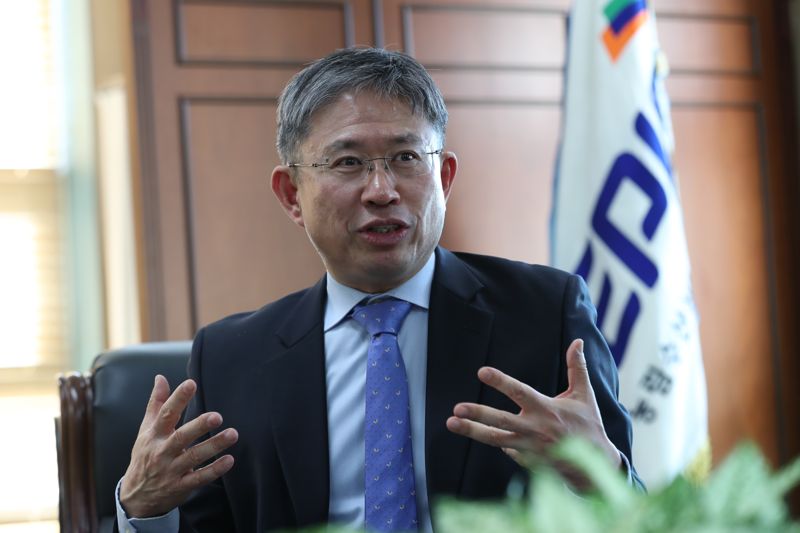[fn People] Yoon Dong-jin, Head of EPIS: “The New Middle-Aged Generation and Local Startups Will Be Key to Return-to-Farming and Rural Migration”
- Input
- 2025-11-04 14:04:33
- Updated
- 2025-11-04 14:04:33

Yoon Dong-jin, head of the Korea Agency of Education, Promotion and Information Service in Food, Agriculture, Forestry and Fisheries (EPIS), emphasized the importance of the new middle-aged generation and the local economy in the context of return-to-farming and rural migration.PhotoHe stressed the need to broaden current support policies, which are focused on youth and agriculture, to include middle-aged individuals and local startups, and to provide diverse education and information. To this end, EPIS plans to redesign the functions of its platforms, including the Return-to-Farming and Rural Migration Support Center and the online platform 'Greendaero.'
In an interview on the 4th at the EPIS office in Sejong Special Self-Governing City, Yoon Dong-jin stated that diversification is key to return-to-farming and rural migration policies. He explained that new approaches are necessary to overcome the growing problems of regional extinction and the declining number of farmers. For return-to-farming, he suggested focusing on agricultural competency and specialized crop cultivation training, taking climate change into account. For rural migration, he recommended segmenting policy targets into youth, middle-aged, and retirees, and diversifying startup models centered on the local economy.
Yoon Dong-jin remarked, “The core of return-to-farming and rural migration policies should shift from simple attraction projects to balanced development strategies. The goal is not just short-term relocation, but settlement and contribution to the local economy.” He added, “The main drivers of new changes in return-to-farming and rural migration are likely to be people coming from outside. Those from established generations without an agricultural background can become central to this transformation.” He further emphasized the need to segment policy targets into youth, middle-aged, and retirees, and to expand the focus from agriculture to the local economy.
Yoon Dong-jin is particularly interested in return-to-farming and rural migration among the new middle-aged generation. With the number of return-to-farming and young farmers declining, middle-aged individuals from diverse backgrounds can play new roles in the local economy. Last year, the average age of those returning to farming and rural migration was 52.9 and 43.1, respectively, indicating they are part of the economically active population. The number of return-to-farming households decreased by 2,064 (20.0%) from the previous year to 8,234, while young return-to-farming households dropped by 36 to 1,076. In contrast, rural migration households increased by 4.0% to 318,658, and young rural migrants rose by 5.0% to 139,016.
He stated, “EPIS aims to collaborate with relevant ministries and agencies on local creator-type rural migration policies. We plan to expand connections with local policies and education focused on arts, content, and communities to diversify rural migration and startup models.” He added, “Practical training will include digital content, agri-food processing, and the use of local resources. We intend to promote education that links production with processing, experiential programs, and cultural content.”
Currently, EPIS serves as the implementing agency for return-to-farming and rural migration policies, providing information and educational platforms for aspiring returnees. Offline, it operates the Return-to-Farming and Rural Migration Support Center, and online, Greendaero. EPIS integrates information dispersed across various institutions, offering comprehensive details on housing, jobs, farmland, and vacant homes in one place. It also provides experiential programs such as 'Experience Rural Life' and professional counseling services.
Yoon Dong-jin explained, “The Center is moving beyond its traditional role of policy guidance and promotion to strengthen its function as a policy hub and administrative integration platform. We are proposing new systems such as the Rural Relocation Coach, Life Support Officer, and Startup Coordinator.” He continued, “We recognize the need for Greendaero to become an Artificial Intelligence (AI)-based integrated information platform. Through a personalized online platform, we are institutionalizing a demand-driven communication system for aspiring returnees, local residents, and local governments, while continuously managing issues and developing differentiated services.”
junjun@fnnews.com Choi Yong-jun Reporter